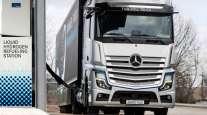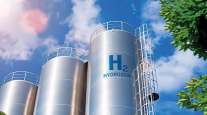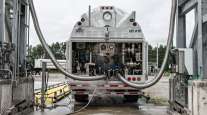Staff Reporter
North Dakota to Spearhead Four-State Hydrogen Hub

[Stay on top of transportation news: Get TTNews in your inbox.]
North Dakota Gov. Doug Burgum has formed a regional hydrogen hub with the governors of Minnesota, Montana and Wisconsin as states continue to jockey in the race for federal funds and national eminence.
“By bringing together our expertise in agriculture and energy production, we can create a world-class hydrogen hub and do even more as states to feed and fuel the nation and the world,” Burgum noted.
The Heartland Hydrogen Hub was formed Oct. 5 through a three-page memorandum of understanding among the four states to use their combined strengths to create a regional clean hydrogen hub to help meet U.S. clean energy, transportation and agricultural needs.
The MOU said that the group of states is a bipartisan effort whose member states already have several planned clean hydrogen projects “that competitively favor the region’s leadership in the hydrogen economy, including plans for greenfield development of clean hydrogen projects as well as some of the largest brownfield conversion assets with the goal of being the largest in the country.”

North Dakota Gov. Doug Bergum
The Heartland Hydrogen Hub will compete for a slice of $7 billion that the U.S. Department of Energy has allocated to establish six to 10 regional hydrogen hubs across the United States. Hydrogen hubs are being viewed at a federal level as part of achieving a clean net-zero energy economy by 2050 as envisioned by President Joe Biden.
Regional hydrogen hubs across the nation must submit concept papers by Nov. 7 describing why they should be among a handful chosen. Full applications are due April 7.
DOE contends that hydrogen’s characteristics “make it a strong option to decarbonize energy-intensive heavy industry and support heavy-duty transportation.” Hydrogen can be produced from clean, diverse and domestic energy resources (wind, solar and nuclear energy) or using methane while capturing resulting carbon to reduce emissions.
According to the Burgum’s office, North Dakota will shoulder the effort through its Energy & Environmental Research Center at the University of North Dakota in Grand Forks. EERC (which operates the National Center for Hydrogen Technology) will develop the application in collaboration with industry partners and state coordinators from all four states.
“North Dakota is pleased to help lead these efforts as part of our all-of-the-above energy strategy and our focus on innovation over regulation to meet our nation’s changing energy needs,” Burgum said. “We are grateful to these states and their governors for their participation, collaboration and shared interest in American energy production, U.S. energy security, job creation, economic development and environmental stewardship.”
Also signing the agreement were Montana Gov. Greg Gianforte, Minnesota Gov. Tim Walz and Wisconsin Gov. Tony Evers.
“Minnesota is working to expand our clean energy economy and meet the changing needs of industries across our state with innovative solutions,” Walz noted. “I look forward to working with these states to secure a critical investment in clean energy and create a world-class hydrogen hub.”
Minnesota is working to expand our clean energy economy and meet the changing needs of industries across our state.
Minnesota Gov, Tim Walz

Part of the MOU notes that all states have agreed to identify opportunities to collaborate with tribal nations. The winning hydrogen hubs will be those that “include substantial engagement of local and regional stakeholders, as well as tribes, to ensure that they generate local, regional and national benefits,” the DOE funding notice stated.
DOE’s $7 billion funding opportunity, announced Sept. 22, noted that each hydrogen hub will include multiple partners that bring together diverse hydrogen technologies to produce and use large amounts of hydrogen in different ways.

Evers
“Clean hydrogen has the potential to play a key role in our clean-energy efforts here in Wisconsin and across the country, and I’m proud to be working together with this bipartisan group of governors to do the right thing for our states’ futures,” Evers said. “This agreement is another positive step toward developing a strong network for clean hydrogen producers and consumers, and it will contribute to our critical work to expand economic opportunity, create jobs, reduce emissions and lower long-term costs as we work to achieve the goals of our Clean Energy Plan.”
Wisconsin and Minnesota also are partners in the Midwestern Hydrogen Coalition, formed Sept. 19 with the governors of Illinois, Michigan, Kentucky, Ohio and Indiana.
Minnesota’s Department of Commerce will be the lead state agency for the Heartland Hydrogen Hub and the Midwestern Hydrogen Coalition.
Other hydrogen hubs formed throughout the nation include a New York-led group (with Connecticut, New Jersey, Maine, Massachusetts, New Jersey and Rhode Island), the Western Inter-States Hydrogen Hub (Colorado, New Mexico, Utah and Wyoming), HALO hydrogen hub (Arkansas, Louisiana and Oklahoma) and the West Virginia Hydrogen Hub Working Group.
Want more news? Listen to today's daily briefing below or go here for more info:




